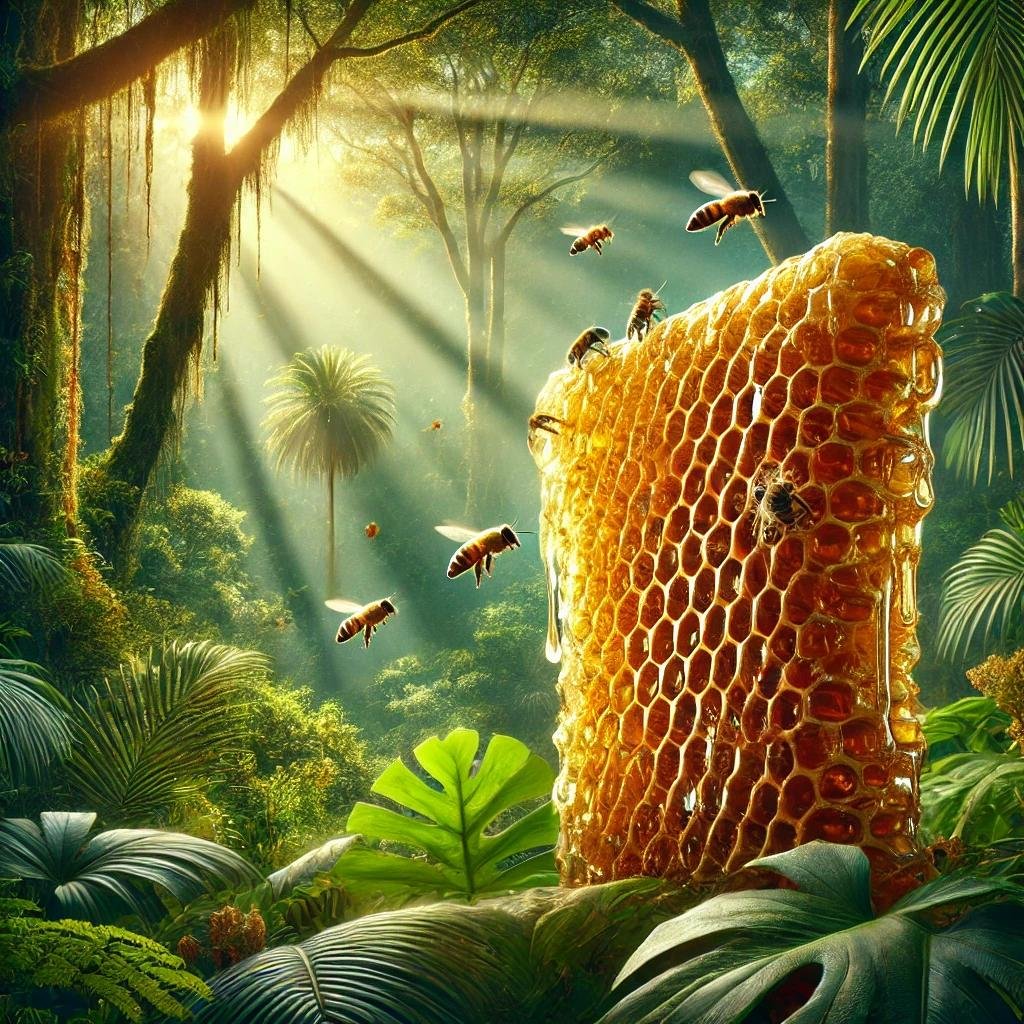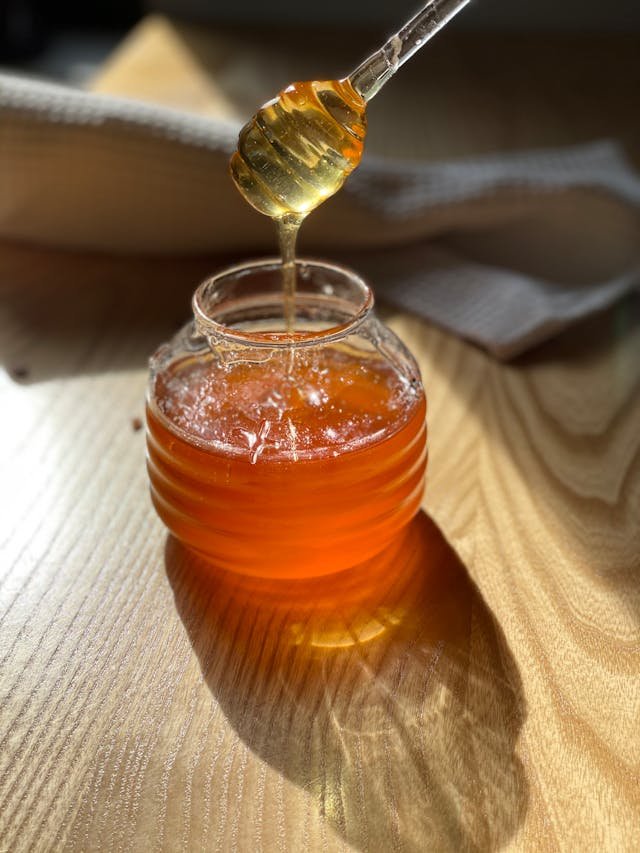In Africa, Jungle Honey is natural, and harvested from forests untouched by human hands. Find out about its health benefits, how it’s harvested, and its growing market. Find out why African Jungle Honey is unique
What You Need to Know About Jungle Honey in Africa

What is Jungle Honey?
The African forests and jungles serve as unique sources for making Jungle Honey. Natural bees in unspoiled wild territories produce this honey which stays completely free from pesticides and chemical substances. Honey bees obtain nectar from untamed wildflowers situated in the deep African forests which produces this honey’s exciting unique taste. People value Jungle Honey because it remains chemical-free as well as holds substantial nutritional value and contains natural healing abilities.
The unprocessed and raw condition of Jungle honey provides people with a more natural choice than they would get from commercial honey products. Medical communities throughout Africa have relied on this honey as a treatment for wounds and immunity enhancement for an extended period.
The Origins and Significance of Jungle Honey in Africa
Jungle Honey originates from Africa through the history of its biological environments and traditional ways of the continent. Throughout the centuries African communities have harvested the forest resources which include jungle honey. African cultural beliefs consider jaz going beyond dietary use to be a nature-bestowed sacred treasure. People have practiced honey extraction in wild forests according to ancient customs because they harvested the sweet liquid from trees found in deep untouched jungles. The traditional methods for collecting jungle honey remained essential components of cultural practice since each cultural area developed distinct collection techniques based on their native flora and environmental conditions.
Local traditions and spirituality place huge importance on Jungle Honey and its collection in nature. The African tribes regard honey as both a sacred symbol of vitality and a symbol of purity. People utilize this honey during sacred ceremonies and sacred rituals and healing practices because they consider it has the ability to purify bodies and spirits. Healers have admired Jungle Honey’s medicinal properties because they utilized it to treat wounds and infections dating back to a time before widespread modern medical practices.
The harvesting of jungle honey occurs within the untouched jungle regions stretching across the wilderness of West Africa through Central and East Africa. Bees maintain their habitat in pesticide-free spaces while foraging nectar through numerous wild African plants and flowers that grow naturally in jungle environments. Jungle Honey separates nectar from various wild plants into its distinct earthy flavor with natural nutrients known for its high value worldwide and locally.
The production of Jungle Honey supports the continuous stability of African ecological systems. The conservation of bees, their habitats and their food sources remains possible through the support of jungle honey operations which help protect African forests and wildlife. The African communities combine beekeeping with environmental harmony because it serves as both an economic activity and a practice for sustaining natural-human balance.
The growing international interest in organic natural products allows Jungle Honey in Africa to gain substantial recognition because of its special honey origins along with premium quality. The honey from the jungles maintains significance as both a local economic transaction format and a medicinal component alongside its function as a sweet delight to African citizens.
Types of Jungle Honey Found in African Jungles
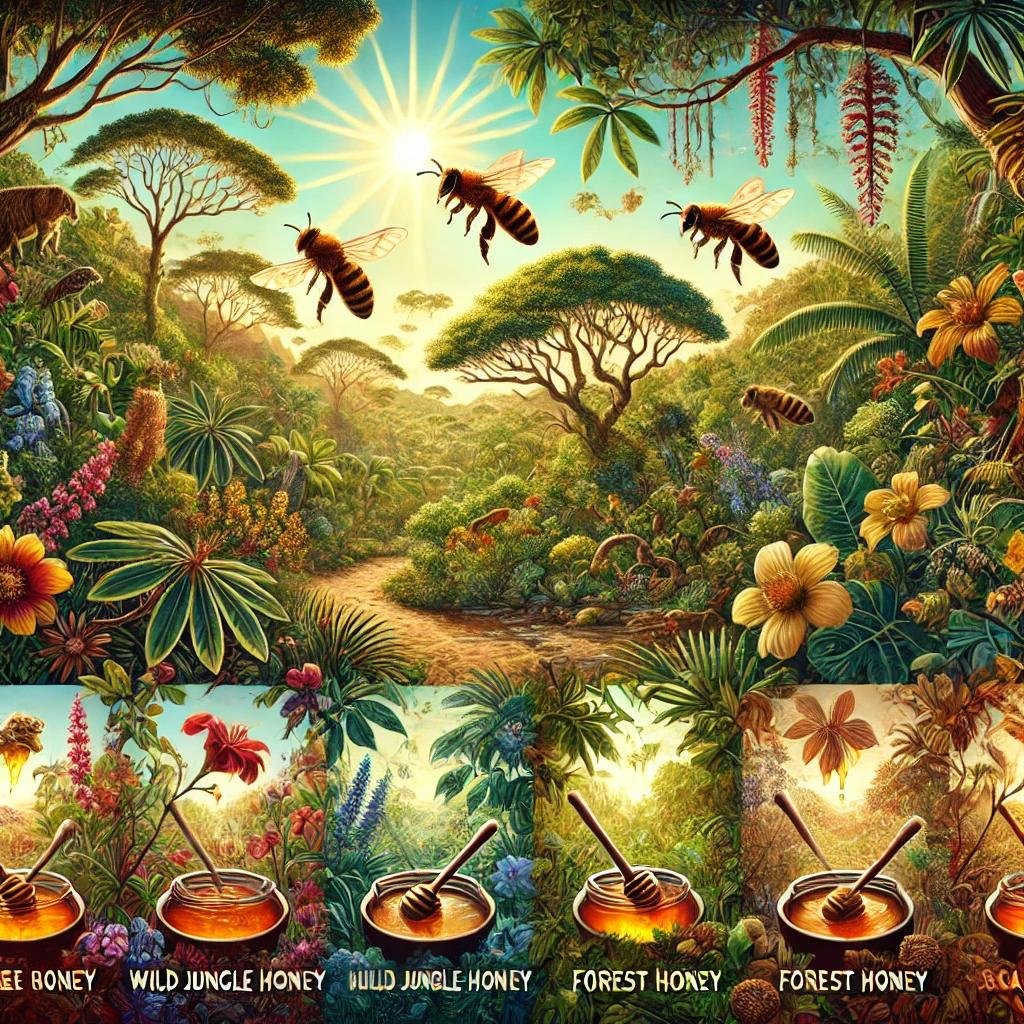
African jungles reveal two separate types of honey harvest: Wild Jungle Honey and Forest Honey. Dual types of honey exist in the African continent including the prized Wild Jungle Honey alongside Forest Honey which differ based on source plants and collection areas.Here’s the comparison of Wild Jungle Honey vs. Forest Honey
Aspect | Wild Jungle Honey | Forest Honey |
Origin | Sourced from remote, untouched wilderness areas in Africa. | Users gather forest honey from regions where trees and shrubs exist in dense surroundings.. |
Nectar Source | Bees gather nectar from a variety of wildflowers and plants. | Bees collect nectar from trees, shrubs, and wild plants. |
Flavor Profile | Rich, complex flavor with earthy, herbal, or floral notes. | Deep, robust flavor, often with woodsy or smoky undertones. |
Color | Varies from golden to amber, with a lighter tone. | Typically darker, ranging from amber to deep brown. |
Texture | Light to medium viscosity, with a smooth consistency. | Thicker, more viscous texture, often with a creamy consistency. |
Geographical Locations | Found in remote regions like Congo, Uganda, and parts of Tanzania. | Common in forested regions of Kenya, Tanzania, and other East African areas. |
Harvesting Method | Typically harvested in wild, natural environments. | Harvested in managed forests or dense wooded areas. |
Key areas for Jungle Honey in Africa
The principal areas which produce Jungle Honey across Africa exist in different locations.The high-quality Jungle Honey produced in various African nations develops unique flavor compositions determined by their native floral species.
- Congo’s vast rainforests provide the perfect conditions for harvesting Wild Jungle Honey which has an earthy taste and is collected within the world’s most biodiverse region.
- All across Kenya people value the pure and flavorful characteristics of local honey production. The native trees of acacia and wildflowers in rural Laikipia and Maasai Mara provide the base for gathering Forest Honey which presents a mixture of sweet and slightly tangy notes.
- Tanzania contains biodiverse jungles that produce honey with harmonious floral and herbal tastes. The untapped natural terrain of the country delivers top-quality Wild Jungle Honey that tastes smooth and sweet.
- Uganda emerges as an essential participant in the African Jungle Honey sector through its output of Forest Honey which materializes as dark amber colored product with caramel-like taste attributes because of its extensive forests and distinctive vegetation.
The combination between these regions produces Jungle Honey while also keeping sustainable beekeeping methods which conserve both nature and biodiversity in their areas.
Unique Flavors of Jungle Honey from African Rainforests
The flavor variations of African rainforest Jungle Honey match the wide range of plants and flowers that exist in the area. Wild Jungle Honey contains sweet and earthy flavors accompanied by prolonged floral sweetness across the tongue. A honey’s flavor note depends considerably on what plant species the bees visit in their chosen region. The tropical Congo forests produce honey with stronger herbal characteristics whereas East African forests produce a lighter floral wild berry-flavored honey.
The texture of Forest Honey feels thicker while its intense flavor leads to amber-colored honey through almost black tones. The bees who feed on forest tree nectar from acacia and eucalyptus produce honey with deep woody taste features and occasional smoky notes. The tangy sweetness of forest honey makes it particularly useful for cooking purposes such as glazing and marinade creation.
Jungle Honey develops its unique taste characteristics because of the distinct climate features throughout these areas. The environment of African rainforests provides bees with all needed elements for producing honey which serves as both tasty natural sweetener and vibrant portraiture of the ecosystem’s diversity.
Health Benefits of Jungle Honey
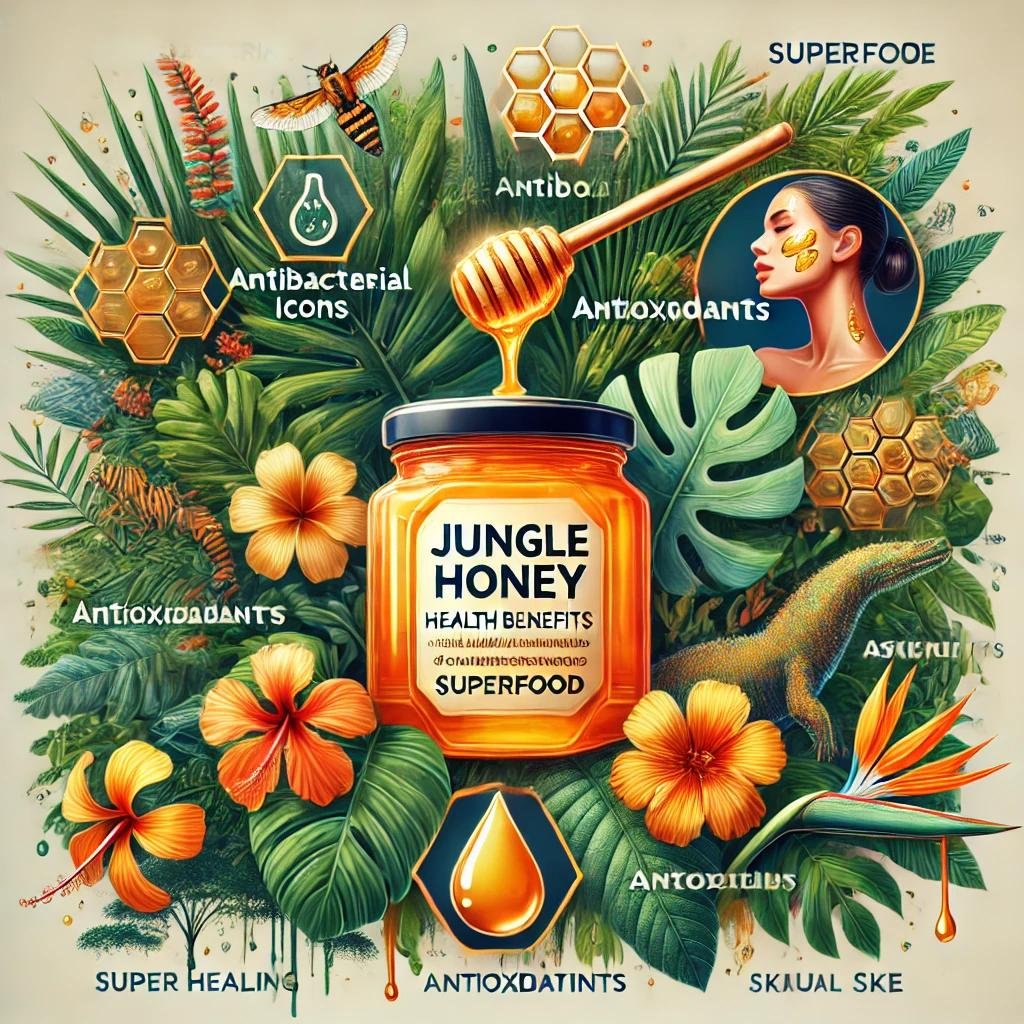
Jungle honey exists in the pristine jungles of Africa besides other tropical regions where it received respect for centuries because of its outstanding health advantages. Because wild bees collect jungle honey in unblemished nature reserves the end result becomes a highly nutritious pure form of honey. The health benefits of jungle honey as a superfood become increasingly recognized because it provides rich quantities of vitamins along with minerals and enzymes.
Why Jungle Honey is Considered a Superfood
The health benefits of jungle honey qualify it as a superfood classification. Jungle honey brings the distinction of superfood to itself because it contains a dense range of essential nutrients. The nutritional value of jungle honey exceeds expectations since it contains abundant antioxidants together with necessary vitamins B and vitamin C alongside essential minerals magnesium and potassium and zinc. The nutritional elements found in jungle honey function as vital compounds to enhance body wellness and strengthen immune defense mechanisms and generate vitality. Jungle honey keeps its beneficial components intact because of its natural state thus serving as an essential element for nutritious diets.
The antioxidant properties of raw honey as well as jungle honey have been demonstrated through research studies. The antioxidant substances make jungle honey the preferred medical treatment to enhance wellness and strength in the body. Health practitioners endorse raw honey because it regulates blood sugar without synthetic additives due to its reduced glycemic value than standardized sugars.
Medicinal Benefits: Antibacterial, Antioxidant, and More
Jungle honey stands out due to its multiple medicinal features because it possesses antibacterial and antimicrobial properties alongside antioxidants. The antibacterial quality of jungle honey develops because its enzymes produce hydrogen peroxide which acts as a disinfectant. The antibacterial features of jungle honey prove effective for treating both ulcers and congestion in the throat. People utilize Manuka honey originating from New Zealand as a tropical honey in worldwide hospitals to treat both hospital burns and ulcers while its powerful antibacterial properties accelerate wound healing.
Multiple studies indicate that jungle honey possesses properties to enhance human immune function. Antioxidants contained in jungle honey act as neutralizers that counter free radicals which lead to cellular damage and develop into chronic diseases so they contribute to the aging process. Medical research shows that jungle honey produces anti-inflammatory properties that help control body inflammation while also relieving pain brought on by arthritis. Research is suggesting that raw and unprocessed honey contains strong antioxidants which protect cellular structure according to a Journal of Medicinal Food publication.
Pure Jungle Honey for Skin and Wellness
Pure jungle honey maintains high demand in skincare since it offers natural soothing properties with healing capabilities. Jungle honey contains various important compounds of enzymes and amino acids and vitamins to generate healthy and glowing skin. The anti-inflammatory and antioxidant compounds in jungle honey function as a superior natural solution to treat acne while also reducing inflammation in dry skin and minor skin discomforts. Many skincare brands presently use jungle honey as a fundamental component to develop moisturizers along with masks and lotions because it simultaneously keeps moisture intact while supporting skin recovery.
Jungle honey effectively treats skin wounds as well as acne because of its built-in antibacterial properties. Per the International Journal of Dermatology raw honey particularly works as an antibacterial agent that reduces acne breakouts and speeds up pimple healing timelines through its antimicrobial features. Pure jungle honey users have discovered that it improves both their skin tone and texture which strengthens its wellness advantages.
People commonly use Amazon Jungle Honey as a skincare ingredient because of its antibiotic content and antioxidant capacity harvested from South American rainforests. Pure jungle honey wins praise because it hydrates the skin while it fights aging signs and preserves skin flexibility.
How Jungle Honey is Harvested in African Jungles
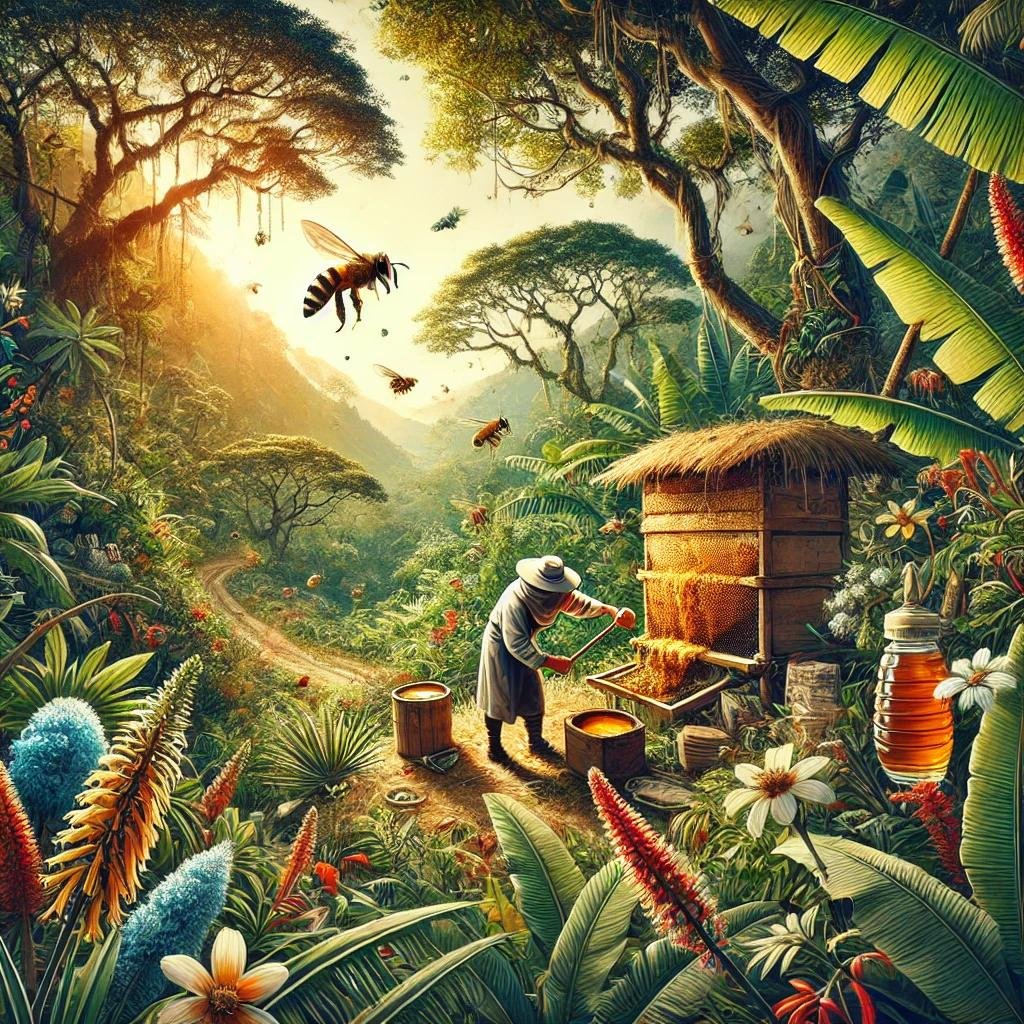
Sustainable Beekeeping in African Rainforests
Jungle honey collection in Africa follows sustainable beekeeping methods mainly because rainforests and distant jungles thrive in these areas. Beekeepers in these regions practice traditional honey production which has been handed down through family lines and protects both nature and maintains ecological stability. The beekeeping practices in Tanzania together with Uganda and Kenya promote healthy wild bee colonies within natural forests to attain sustainable honey harvesting. The practice sustains bee populations while maintaining rainforest biodiversity along with it.
Sustainable beekeeping plays an essential role throughout Africa because this practice enables the protection of vital natural ecosystems. The honey collection from these areas is produced by bees that feed on the extensive number of plants and flowers that grow naturally in unperturbed habitats. Beekeepers who protect wild bee populations play a role in plant pollination which ensures proper health of their native ecosystems.
The modern honey industry adopts organic beekeeping standards to remove pesticides and chemicals while producing pure organic honey. A rising number of South African beekeepers are moving toward producing certified organic honey under the guidance of international organizations which provide consumers worldwide with officially organic products.
The Challenges of Harvesting Honey from the Wild
The process of collecting jungle honey from African rainforest ecosystems presents multiple obstacles to harvesters even though the product brings attractive health and visual elements. One main difficulty of jungle honey harvesting emerges from its hard-to-reach location within remote sites. The natural habitat of wild beehives requires beekeepers to navigate through thick wooded areas along with difficult landscapes to access these hives in remote forest locations. The harvesting operation in Congo Basin as well as Uganda becomes perilous due to wild animals combined with problematic weather elements and insufficient local infrastructure. The difficulty of accessing jungle honey bee colonies extends both time duration and labor demand during harvest operations.
Bee populations face a continuous decline because of environmental hazards including climate change and deforestation together with habitat destruction. African beekeepers implement improved hive management practices to counter these environmental threats although the ongoing environmental stress weakens honey production. Areas in Kenya show that beekeepers encounter substantial decreases in honey production since environmental degradation destroys the plants that bees need to collect nectar.
The unknown elements of African jungle weather particularly during rainy seasons produce additional difficulties for beekeepers. Severe rainfall conditions harm beehives and render honey production less efficient since excess water dilutes the product or complicates extraction procedures.
Ethical and Organic Honey Production in Africa
Africa experiences a rising demand for natural, ethical, organic products so stakeholders are building an ethical organic honey industry in the region. African beekeepers have started implementing methods toward bee health by protecting both their creatures and ecosystems as well as their community neighbors. Ethical honey production through initiatives in Kenya and Tanzania develops momentum because it enables payments at fair wages to local farmers and beekeepers and supports environmental protection programs.
Some African honey cultivators utilize fair trade standards that guarantee both acceptable wages for their workers and economic enrichment for their nearby communities from their honey earnings. The practice of responsible honey harvesting serves as a growing strategy because it safeguards the well-being of bees while retaining adequate honey supplies for hives through annual periods.
Organic honey production within African jungles keeps expanding because consumers seek honey that contains no artificial chemicals while remaining naturally pure. Organic honey collected from chemical-free forest environments delivers excellent product quality to customers while enabling environmental and bee conservation. In South Africa the Wild Honey Producers Association leads support for organic honey production through beekeeping strategies that rely only on natural chemical-free beekeeping practices.
African beekeepers use sustainability and ethical measures to protect the rainforests and biodiversity and simultaneously meet international market demands for organic and ethically sourced honey.
Recent Developments:
African countries received heightened support from local governments and non-government organizations for the development of sustainable beekeeping initiatives during recent years. Such programs merge production expansion strategies with protective measures that shield the environment from damage during honey collection. Through government and international organization partnerships Ghana started offering training for local population to master sustainable beekeeping approaches that resulted in greater honey production and stronger local economy growth.
The growing trend of conscious consumerism worldwide is enhancing the market price for organic wild jungle honey products. The producers in Uganda along with Congo are now working to secure international certifications for their products to enter premium markets worldwide.
The Commercial Side: Exporting Jungle Honey
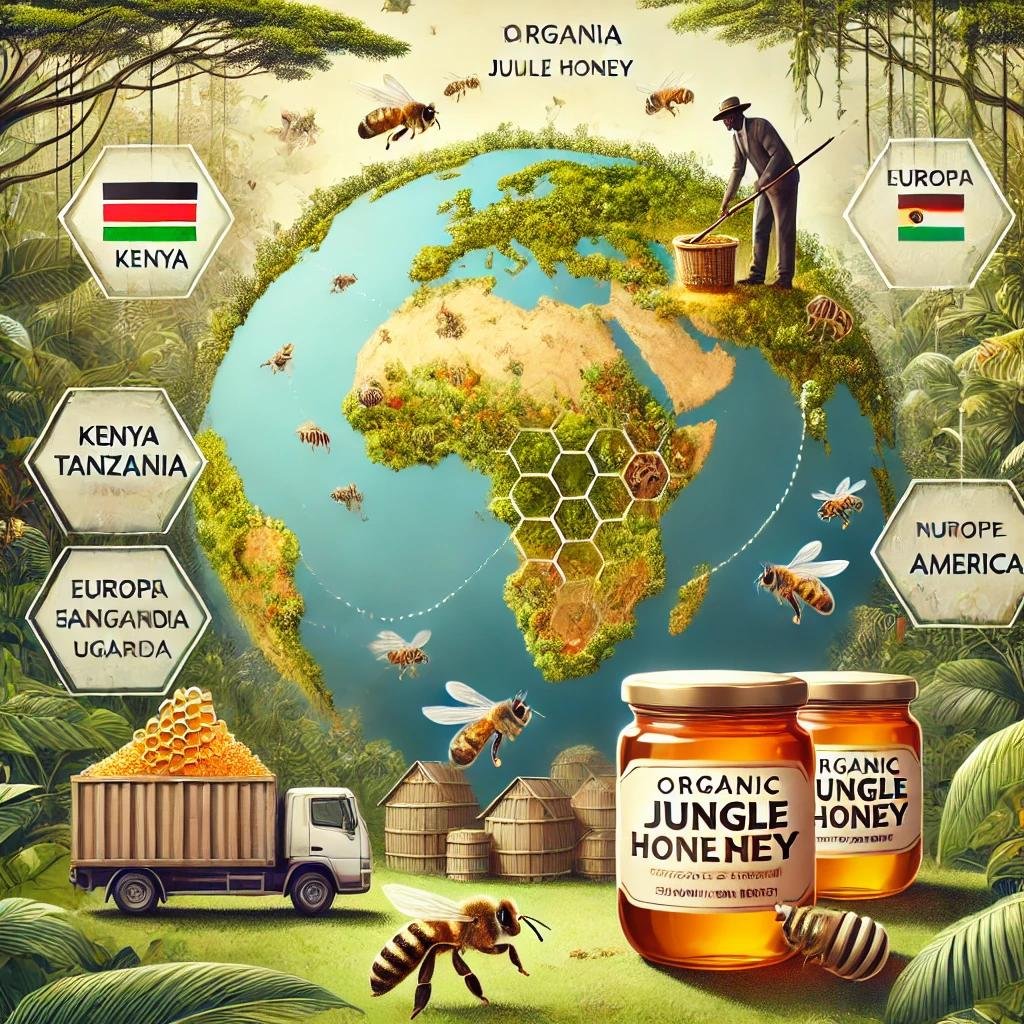
The market demand for jungle honey continues to ascend because of its distinctive appeal including health benefits. The international market has embraced African honey especially Jungle Honey because it contains natural healing benefits combined with pure composition and environmentally friendly production standards. The health advantages of organic and raw products have created rising consumer and business demand for jungle honey across the world.
The Growing Market for Jungle Honey in Africa
Through recent years the market sector dedicated to Jungle Honey production has expanded noticeably throughout Africa which was already renowned for its premium honey quality. A recently published market research confirms the consistent growth of African honey industries because of expanding local markets and enhanced potential for exports. Jungle honey stands ready to capture the rising market interest for natural and organic food items since consumers are choosing this direction globally. Honey produced in Africa now functions as a superior product because it includes distinctive flavor profiles that regular commercial honey lacks.
The increasing number of health-focused consumers seek Raw honey that contains no chemicals or additives as the main element triggering market expansion. Jungle Honey supports the global organic food market because its sustainable production process gathers wild bee honey from remote rainforest areas.
Jungle Honey Exporters and Their Global Reach
Various African businesses have launched activities to send their Jungle Honey products into international export markets. The overseas exporters take advantage of rising consumer demand for premium sustainable honey that combines standard ethical processes and maintains organic fulfillment requirements. Companies situated in Kenyan and Tanzanian and Ugandan territories are spearheading the export movement as their products achieve sales in developed and emerging nation markets.
The Kenyan firm Honey Care Africa pursues expanded operations to fulfill rising international specifications for wild and organic honey products as their main exporter. Local farmers and beekeepers participate in collaborative efforts with the company that combines sustainable practices to achieve both premium honey quality and support local economies.
Tanzanian honey producers have started exporting bigger amounts of raw jungle honey to European and Middle Eastern marketplaces. The medical industries of South Africa alongside Ethiopia have established robust honey exportation lines that primarily focus on pure wild honey production beneficial to human wellness.
The target export destinations for Jungle Honey consist of the Middle East nations and European nations and additional regions worldwide.
Jungle Honey has established its key export territories through the Middle East and Europe together with the United States. The Middle East continues as a vital market for honey since traditional medicines and cosmetic products use this product while including it in their culinary preparations. The Middle Eastern population considers honey as both food and a vital sign of health so it creates an ideal customer base for Jungle Honey from Africa.
Both Saudi Arabia alongside United Arab Emirates (UAE) and Qatar represent the top consumer groups of African honey. The unprocessed nature of Jungle Honey appeals to these countries because their rich healthy residents demonstrate continuous growing demand. The substantial African honey market in UAE continues to grow due to increasing consumer demand for organic and natural products thus driving increased honey exportation from Africa.
Australia along with Germany and the United Kingdom represent major European foreign markets that consume Jungle Honey. The European population now chooses natural and organic food products so Jungle Honey perfectly matches their current market preferences. Consumers perceive wild forest honey as an elite product thus it attracts premium position in both luxury outlets and authentic organic markets.
North American consumers now buy more Jungle Honey because they seek pure organic honey to prepare food and make health supplements as well as skincare products.
How to Buy Raw Jungle Honey from Africa
Raw Jungle Honey can easily be bought from Africa because specialized suppliers and online marketplaces provide a growing selection of authentic African honey products. Economic growth within the African honey industry promotes international distribution networks which enable customers along with businesses to obtain honey from its African origins directly.
Customers can acquire raw Jungle Honey purchased directly from African exporters by using various online marketplaces such as Amazon or Etsy and more specialized organic websites. Customers can explore various honey types through these platforms as they access supplier websites which prioritize organic and ethical procedures for their purchases.
African producers together with cooperatives provide direct access to raw jungle honey purchase opportunities through their online websites and stores which sell premium raw honey in bulk. Kenyan Honey Exporters together with Tanzanian Beekeepers provide suppliers who distribute their products by jar units or bulk amounts serving both retail customers and industrial customers.
The specialized organic store network spanning Europe and North America sells premium-certified organic Jungle Honey products which include African honey as part of their extensive product line. They operate as retail outlets which guarantee ethical collection methods alongside adherence to worldwide quality mandates for the honey products.
You can find African honey exporters through attending trade exhibitions and fairs specialized for organic food products if you plan to import Jungle Honey for your business. Worldwide trade events permit business entities to develop personal connections with suppliers who participate in these meetings held in different urban regions.
Quality Control and Certification for Jungle Honey
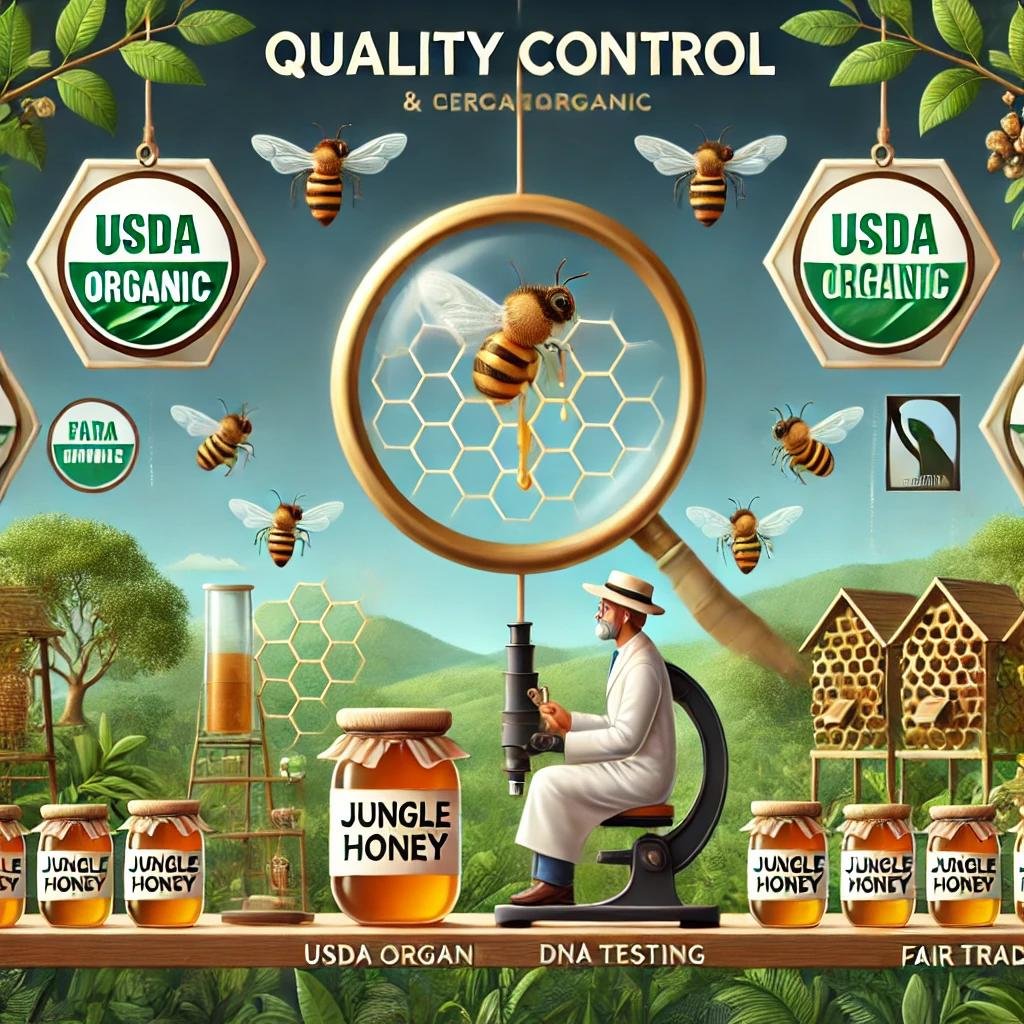
The African Jungle Honey market expands swiftly because the global market demands pure organic sustainable food products. The global market currently expands across three regions: the Middle East as well as Europe and North America to establish African Jungle Honey as a prominent health-conscious product selection choice for consumers together with businesses. Jungle Honey acquisition from Africa now presents itself as simpler for both small-scale purchasers and major market distributors.
What Makes Jungle Honey High-Quality?
The value of Jungle Honey derives from its immaculate nature combined with its deliciousness and its healthier components. Wild bees dwelling in unspoiled spaces especially protected African rainforest areas provide the source for high-quality Jungle Honey. Several conditions determine honey quality such as where bees collect nectar along with the health state of bee colonies and how extraction takes place.
The specific wildflowers together with native plants which the bees traverse during nectar collection define Jungle Honey’s final quality. The different types of wildflowers found across Uganda and Kenya and Tanzania enable the bees to produce honey with diverse rich flavors because of their collective floral sources.
Local beekeepers practice manual and sustainable honey harvests of Jungle Honey by avoiding both synthetic interventions as well as chemicals during the process. The harvesting process keeps the honey in its natural state without processing thus it maintains all its original enzymes, vitamins and antioxidants.
The Importance of Organic Jungle Honey Certifications
Organic certifications now constitute a fundamental aspect of the Jungle Honey industry as they progress through recent times. The increase of global shoppers who care about purchase sustainability brings verification systems which confirm both organic standards and ethical sourcing of honey products.
A honey product qualifies as organic when it originates in chemical-free forest areas that lack pesticide and herbicide use or any toxic residue. This trend matches the worldwide initiative for environmentally conscious sustainable agricultural methods.
Jungle Honey has obtained three fundamental international certificates which are the USDA Organic while also encompassing EU Organic and Fair Trade standards. The certifications guarantee that producers of honey meet defined standards regarding environmental protection as well as working practices and ethical conduct. The Fair Trade certification system guarantees decent remuneration and workplace safety and loca development investment for workers who produce honey.
Organic certifications enable small-scale beekeepers along with cooperatives to sell their products through major international markets that previously denied them access because of growing sustainable product demand. Fair trade certifications and organic accreditation have spread internationally leading African honey producers to receive these certifications that enhance Jungle Honey’s international market potential.
Ensuring Authenticity and Avoiding Adulteration
The increasing market demand for certified organic and raw honey has prompted more potential adulteration situations in the industry. The mixing of fake honey with low-cost syrups and processed honey materials damages the trust of customers and undermines market standards. Authentication needs to be a main factor in every step of Jungle Honey production and its global trading operations.
Laboratory testing represents an effective method to verify authenticity because it provides critical proof of product authenticity. Modern DNA testing establishes the floral source of honey through analytic methods which verify it originates in the wild forests rather than artificial settings. Honey purity is verified by laboratory tests which identify its authentic status without any mixture with additional substances.
The International Honey Commission created honey fraud prevention protocols with NMR and IRMS testing approaches to spot adulterants while verifying authenticity.
Traceability systems function as records to track honey products through the complete supply chain starting at the beekeeper ending with consumer delivery. Consumers can verify the honey source through these tracking systems because they confirm its origin from certified sustainable authentic sources
Challenges in the Jungle Honey Business
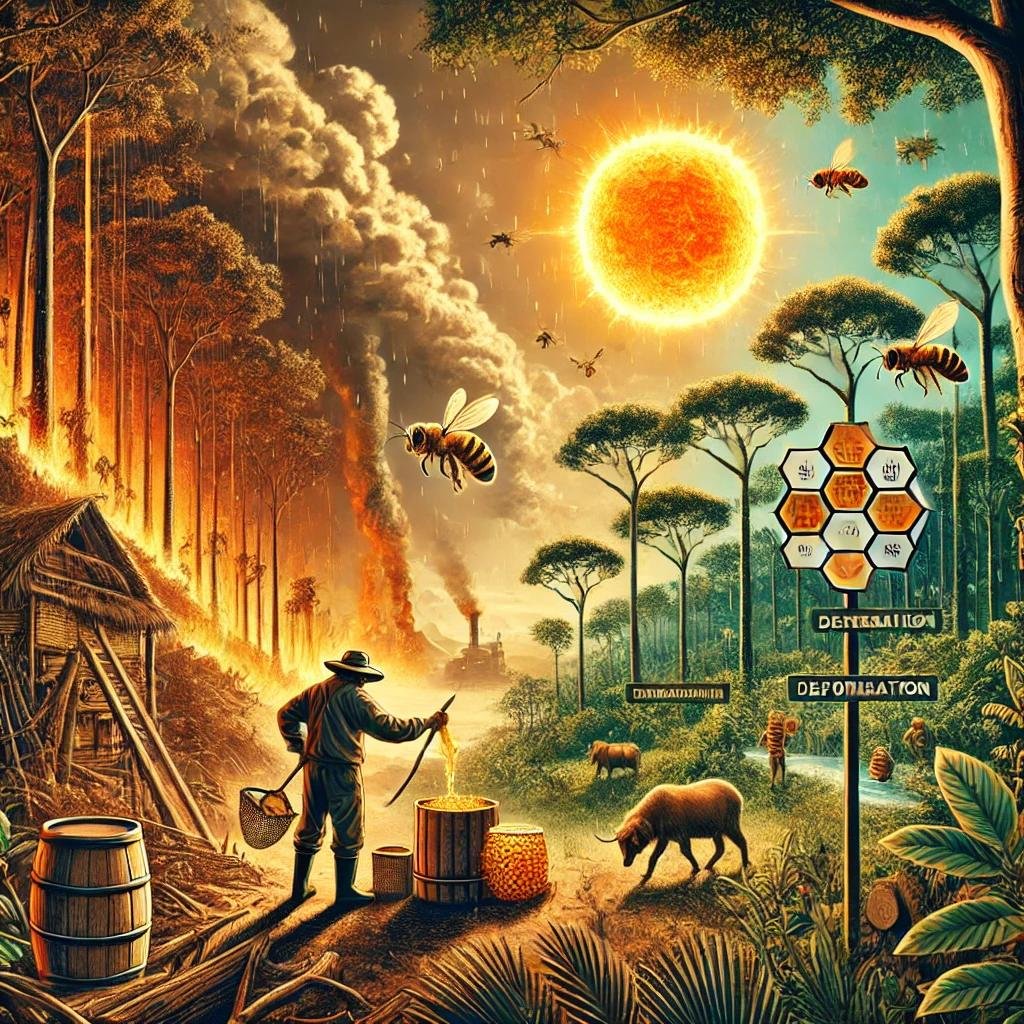
Jungle Honey production in African regions encounters several obstacles that both hinder its manufacturing process and restrict market entry. Jungle Honey receives high value because of its pure and sustainable character and health advantages but challenges with the environment and logistics systems block its growth expansion. Sustainable honey production in Africa needs targeted solutions from all stakeholders because climate change together with deforestation and supply chain problems create ongoing threats to the industry.
Climate Change and Its Effect on Honey Production in Africa
Global climate change stands as a primary difficulty which affects the Jungle Honey industry today. The heating climate and irregular rainfall disrupts the natural eco-systems which honey bees utilize for their production activities. Flowers and plants that generate nectar for honey rely on bees as their main pollinators since these insects remain vulnerable to environmental transformations. The World Meteorological Organization (WMO) reported climate change has resulted in elevated occurrences of extreme weather conditions such as droughts together with floods and temperature variability. These environmental alterations modify bees’ nectar gathering capacity and flowering seasons as well as deteriorate the well-being of bee colonies.
Procedemic regions like Kenya and Uganda along with Uganda create considerable volumes of Jungle Honey yet erratic rainfall patterns reduce the essential nectar flow durations thereby minimizing honey production. The results of such climate shifts demonstrate they cause a 30% cutback in honey production within particular locations. Rising temperatures compromise the natural habitat of bees so they struggle to maintain an appropriate environment for survival.
The International Federation of Beekeepers Associations (Apimondia states that worldwide bee population declines have reached 40% because of climate change since the last several decades. Bees remain vital for pollination activities which places honey production and agricultural systems depending on bees’ pollination activities at risk resulting in food security threats throughout Africa.
The Risk of Deforestation and Loss of Honeybee Habitats
Deforestation stands as a major threat against the creation of Jungle Honey at African locations. The regions that sustain top honey production in Africa primarily exist in both rainforests and protected natural habitats which support productive bee environments. The practices of illegal logging and agricultural expansion together with urbanization activities are causing extensive deforestation throughout the area. Forest destruction causes minimized bee habitat spaces which subsequently results in reduced nectar availability needed for honey production.
Large-scale logging along with agricultural activities in Congo Cameroon and Tanzania create difficulties for bees to locate suitable hive sites and nectar sources because forests are disappearing at an alarming rate. The rainforest faces extreme vulnerability since its species diversity enables bees to reach their required nectar sources. These lost ecosystems decrease the supply of honey raw materials while endangering biodiversity in ways that intensify climate change risks.
Forests across Africa experience annual destruction of 3.9 million hectares of land according to the World Resources Institute (WRI) who also note Central Africa as the most heavily impacted area. The deforestation creates two major problems by interrupting honey yields between bees while releasing carbon into the atmosphere and reducing biodiversity numbers.
Overcoming Challenges in the Supply Chain for Jungle Honey
The Jungle Honey supply chain faces several hurdles in its path towards market accommodation. The Jungle Honey supply chain experiences continuous difficulties in managing its distribution process. Small-scale producers face multiple obstacles in reaching international markets because rising sustainable honey demand meets difficulties from logistical limitations and inadequate infrastructure and expensive transportation expenses. Because most honey originates from rural areas the limited infrastructure and poor road systems and scarce refrigeration access along with inadequate storage spaces cause product quality decline that impedes global commerce.
The basic preservation methods used across areas such as Uganda and Tanzania for honey collection and storage can result in spoilage and contamination of the honey. The exporting costs from rural areas to international markets block small producers from participating because commercial honey producers use lower-priced exporting strategies.
Through the Fair Trade Africa initiative smallholder beekeepers receive needed resources to train their production process which leads to market access worldwide. The Fair Trade certification system has expanded organic Jungle Honey exports from Kenya because it opened European and Middle Eastern markets to local beekeepers.
Public Opinion and Comments
Increased public consciousness about ethical sourcing combined with sustainable production has increased Jungle Honey’s market demand strongly. Together with more environmental consciousness consumers now tend to buy products which support sustainable agriculture. The consumer shopping on Etsy expressed their pleasure about purchasing honey because this transaction helps both their health and supports beekeepers who practice sustainable methods. The methods used for jungle honey harvesting show outstanding success in protecting both bees as well as preserving the environment.
The Jungle Honey industry meets opposition from experts in Kenya who state that climate change together with deforestation create substantial hurdles for the industry. The industry requires enhanced investment in sustainable beekeeping approaches together with better market opportunities across the world.
Recent Data and Industry Feedback
- The Food and Agriculture Organization (FAO) reports that East African honey production fell by 20% throughout the previous decade due to climate change and expanded deforestation which intensified yearly.
- Several initiatives that promote sustainable beekeeping continue to deliver positive results in spite of existing difficulties. Through adopting sustainable hive management techniques combined with improved bee health practices Kenya’s smallholder beekeepers managed to boost their honey production by 25% since the previous five years.
Solutions and Future Outlook
- The protection of honey production relies heavily on implementing beekeeping methods that show resilience against unpredictable weather patterns. The strategy requires educational programs for beekeeping, enhanced hive supervision methods and financial backing for bee species that show resistance to climate changes.
- Authorities together with local communities need to collaborate for the preservation of forests while practicing sustainable logging approaches. Certified sustainable honey producers should establish partnerships with conservation organizations to defend the bee habitats that bees need.
- First-class supply chain infrastructure in rural areas is needed to handle supply chain obstacles. The market value of honey produced by small-scale producers will increase because they receive improved access to roads combined with new storage facilities and better market access infrastructure.
The Jungle Honey industry fights multiple hurdles which include climate change along with deforestation as well as supply chain problems yet several positive solutions and pathways to growth exist. The sustainable future of Jungle Honey production in Africa depends on proper maintenance of environmentally friendly practices alongside habitat protection along with market expansion initiatives.
Conclusion: The Value of Jungle Honey in Africa’s Economy
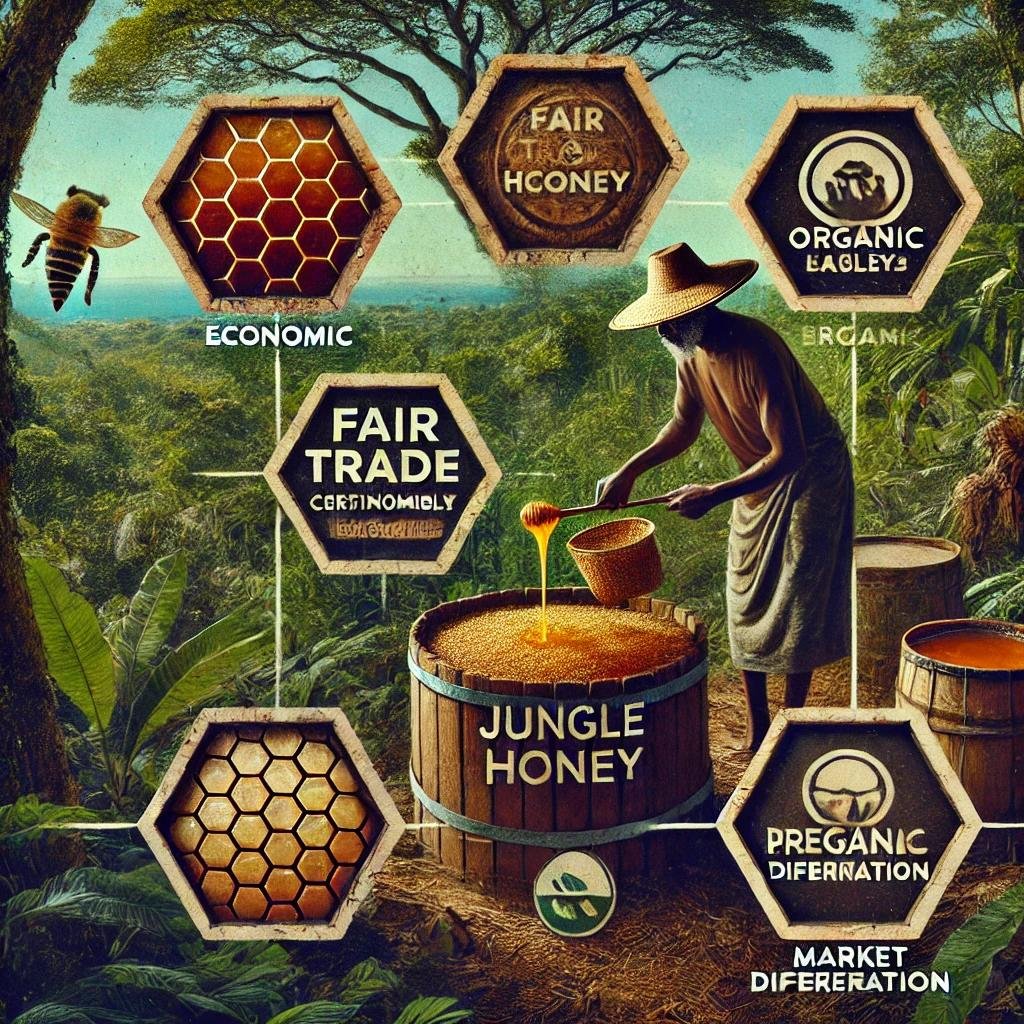
Summary of Jungle Honey’s Role in African Agriculture
Jungle Honey performs two essential functions in African agriculture because communities depend on it both as an agricultural necessity and a driving force of rural economic growth. The wild bees from Africa’s rainforests produce Jungle Honey which represents an extremely organic and natural honey product because of its purity and rich taste and medicinal properties. Jungle Honey brings economic advantages both to the market value chain and to the local communities and preservation of ecosystems.
Highlight Points:
- Production of Jungle Honey includes environmentally safe beekeeping techniques which maintain the integrity of the environment. The beekeepers of Kenya together with Tanzania and Uganda utilize wild bee populations to allow rainforest flora and fauna to flourish. This environment-friendly production process brings benefits to bees and ecosystem together to protect forests and ensure essential plant pollination for local farming.
- The honey and beekeeping operations in Kenya support the economic activities of more than 2 million people who employ their skills to manufacture honey which creates agricultural employment across the region. Jungle Honey is building international market recognition that promotes African honey as a viable global trading product
- The medicinal benefits of Jungle Honey function as a vital aspect in African agricultural systems because of their health-promoting effects. Organic honey from forests is attracting customers from health-conscious markets across the globe since it contains multiple properties such as antioxidants, antibacterial and inflammation reduction. Being a natural item enables support for both local economic development and worldwide wellness and health patterns. Raw organic honey embraces growing popularity throughout North America and Europe which creates a profitable export market for Jungle Honey produced in Africa.
- The practice of beekeeping in African rainforests helps create numerous ecological advantages for both biodiversity and the overall health of natural ecosystems. Bees play an essential role by cross-pollinating different plants that include critical food crops such as coffee beans together with vegetables and fruits. The support of beekeeping through Jungle Honey production leads to the development of a sustainable agricultural framework in an indirect manner.
References:
- “The Role of Beekeeping in Rural Livelihoods and Food Security” – FAO
- The study conducted by Market Research Future focuses on “Global Honey Market Report 2023” known as MR-93062515.
- “Economic Impact of Beekeeping in Kenya” – Honey Care Africa
Opportunities for Beekeeping in African Jungles (Local and International Public Opinion)
The prospects for beekeeping in African jungles are attractive because Jungle Honey gains support from local people and international market participants. Community viewpoint about beekeeping demonstrates dual facets between its financial rise and environmental responsibility.
Local Public Opinion:
The Kenyan beekeeping community decides Jungle Honey delivers reliable financial benefits to especially rural communities which face minimal alternative income sources. Through Jungle Honey the beekeeper reported that his financial conditions strengthened while simultaneously enabling him to defend his forest base.
The training programs on sustainable practices delivered to Tanzanian smallholder beekeepers led to increased honey production rates. Our organization has introduced better practices that led to improvements in both honey volumes and quality levels thereby expanding our market possibilities.
International Public Opinion:
- Raw and organic Jungle Honey attracts health-minded individuals around the world because of its health benefits. The African Jungle Honey has received good feedback from European along with UAE consumers who purchase it through online channels. The purchase of African honey gives me satisfaction because it provides financial backing for sustainable African systems and contains no chemical residues.
- The value that European consumers assign to fair trade qualifications combined with ethical sourcing practices continues to rise. Various honey brands through their retail outlets position Jungle Honey as a high-end premium product which they use sustainable production to attract consumers looking for ethical products.
Why Jungle Honey Should Be a Key Player in Global Honey Markets
The global honey market should recognize Jungle Honey as its primary participant because the company presents outstanding economic prospects coupled with legitimate environmental preservation and distinctive product branding.
Several key factors support the need for Jungle Honey to gain increased market position on a global level.
The production of Jungle Honey creates an outstanding opportunity for African economic growth. Millions of smallholder farmers along with beekeepers throughout Africa will obtain valuable income streams by capitalizing on the rising global market demand for organic raw sustainable products through Jungle Honey.
The wild bee honey collection approach at Jungle Honey provides superior environmental sustainability because their operations function from protected distant locations instead of relying on industrial honey methods through unsustainable harmful practices. The preservation of African rainforests alongside protection of vital pollinators together with biodiversity receives support from this approach.
The unique product offering from Jungle Honey stems from its specific flavor that results from rainforest plant diversity thereby attracting gourmet food market participation.
The health benefits of Jungle Honey stimulate interest among wellness seekers who seek natural cures and superfoods for their health improvement strategies.
The demand for organic raw products in global markets shows great promise for Jungle Honey because consumers understand its antioxidant antibacterial and anti-inflammatory properties of its natural honey. Premium and ethical consumer markets represent an opportunity for the company because it helps establish a competitive advantage.
References:
- “The Global Honey Market Trends and Forecasts” – World Trade Organization
- “Opportunities for Organic Honey Production in Africa” – International Trade Centre (ITC)
- “Sustainability in African Honey Production” – African Bee Keepers Association
Jungle Honey stands to be a significant market force in both the international honey sector and local African economies while enabling sustainable practices alongside delivering high-end market options to worldwide customers. Quality control and sustainability and fair trade practices implemented by Jungle Honey will position the company as a central participant in worldwide honey manufacturing for the future.

